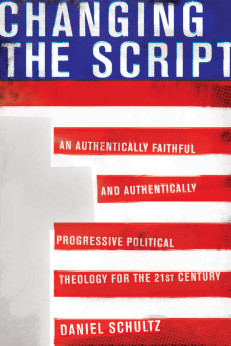
Changing the Script
An Authentically Faithful and Authentically Progressive Poltical Theology for the 21st Century
- 220 pages
- 5.5 x 8.25 inches
- ISBN: 978-19354391-4-1
- 2010-08-01
15.95
“…a complex, provocative, paradigm-shifting book…It was the kind of reading experience I can best describe as my ‘Slow! Wow!’ one, in that I’d read a few pages, have my mind blown by the implications of some of what Schultz was saying, put the book down to think for a few minutes, then pick it up again.”—Susan Gardner, Daily Kos
In recent years, and in particular since the election of Barack Obama, the religious conversation in America has been dominated by calls for progressives to move beyond “partisanship” by reaching out to evangelicals in order to create a “big tent” on social issues such as abortion and marriage equality, despite the lack of evidence that such a strategy can or ever did work. This misguided notion that we can build a shared political and religious center has for the most part shut out true progressive voices, allowing a small conservative minority to control the political and religious debate in this country, with only the most tepid of moral criticism from the religious centrists who claim to desire bipartisan consensus.
In Changing the Script, Daniel Schultz, one of the leading progressive religious voices in America today, builds upon the insights of Old Testament scholar and theologian Walter Brueggemann to identify five “scripts” that exercise unseen power in our society: the therapeutic, technological, consumerist, militarist, and conformist. Confronting each of these scripts and the actions of both the Right and the Left that have allowed them to take root in our culture, Schultz voices a perspective that shows what an authentically progressive and authentically faithful religious ideal would truly look like.
Daniel Schultz is a pastor in the United Church of Christ and co-founder of the blog Street Prophets (www.streetprophets.com), where he writes as “pastordan.” He has contributed to many online sites and publications and is a graduate of the Candler School of Theology at Emory University.
